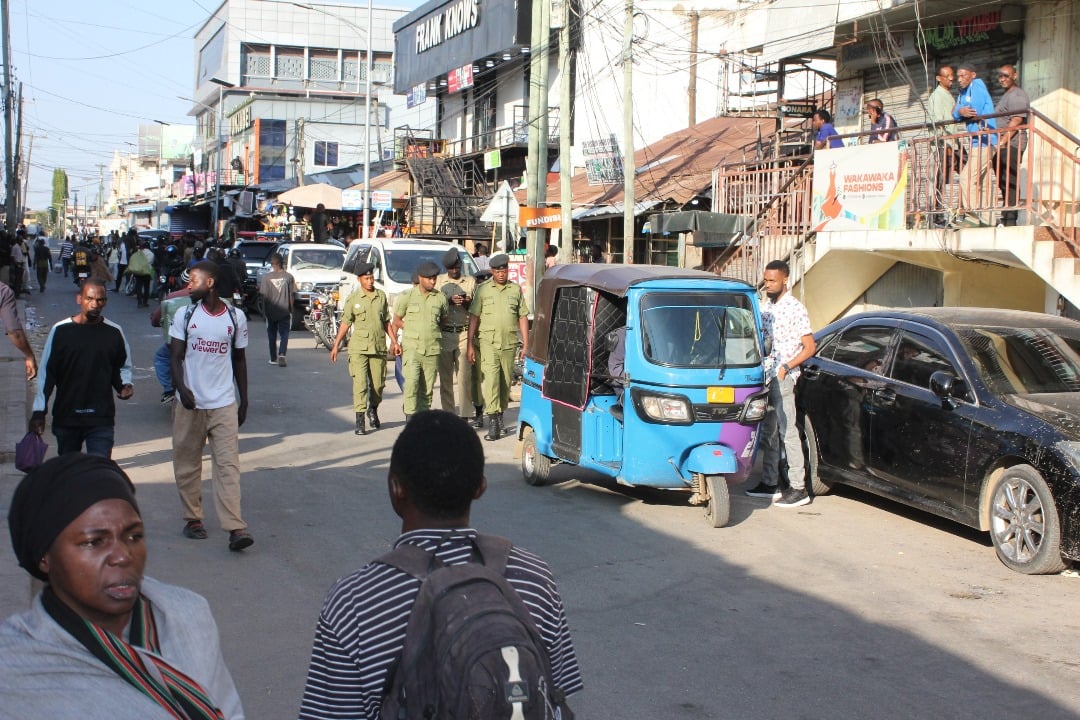
Police are dispatched when the Dar es Salaam traders’ strike spreads to other cities
The strike by traders in Tanzania’s economic hub, Dar es Salaam, is still going strong and is now spreading to other areas of the city and the nation.
The strike began on Monday in Dar es Salaam’s Kariakoo, one of the busiest markets in East Africa and a famous market place in the nation. The reason for the strike is the traders’ discontent with the various taxes and collection strategies used by the Tanzania Revenue Authority (TRA).
As the strike entered its third day, traders were putting pressure on the government to address their concerns, and it had spread to the regions of Mbeya, Arusha, Dodoma, Mwanza, Songwe, Mtwara, Geita, and Iringa.
The strike announcement was a reality on Monday, when the majority of the stores in Kariakoo were closed, despite early local media reports that said it was a hoax.
The government said on Wednesday that it was addressing the concerns of traders even as the strike spreads, but it cautioned that implementing all of them at once would have significant effects on the implementation of some national development projects.
The third day of the traders’ strike began on Wednesday, coinciding with the Finance Minister Dr. Mwigulu Nchemba’s statement in the Parliament.
The implementation of a proposal to lower the Value Added Tax (VAT) from 18 to 12 percent would, according to Dr. Nchemba, cause an immediate Tsh600 billion ($230.3 million) in revenue shortfall, which would hinder the completion of ongoing megaprojects.
The government should combine all taxes into one collection bucket, according to traders, and fines should be lowered to the same level as traffic infractions for any violation of corporate standards.
Furthermore, they contend that the receipt-issuing process shouldn’t be viewed as a new tax because, in their opinion, receipts are just another tool for harassment.
They urge TRA to discontinue its propensity to confiscate their items and to reject traders’ financial accounts that are provided by certified public accountants.
“The government was working on the concerns, but it needed time to find alternative revenue sources to fill the budget gap that would be left by the removal or reduction of some of the taxes as proposed by the traders,” Dr. Nchemba said.
Some vendors in Arusha likewise shuttered their stores for two hours before opting to reopen them. They explained this by saying they were awaiting word from their leaders, who had traveled to Dodoma to hold talks with the government.
They have, however, stated that should their leaders’ conference and the government not address the points they raised, they will join the businesses of other regions to carry on the strike.
Police in cars and on foot were observed policing the city’s streets as the Mwanza business strike started its second day, with businesses remaining closed.
The Citizen saw police cars with officers inside driving around the streets on Wednesday between 12:30 and 3:00 p.m. Additionally, some police were observed on foot patrols throughout the city.
Wilbroad Mutafungwa, the commander of the Mwanza Regional Police, acknowledged the presence of police officers on the city streets in response to a question concerning these policemen. He emphasized that their job is to make sure that traders who are willing to open their stores are safe from disruption by strikers and that their security is improved.
According to Commander Mutafungwa, these security precautions would stay in place until order is restored. He issued a warning, saying that there will be repercussions for anyone trying to bother the vendors who have decided to open their stores.
In addition to affecting temporary workers, these traders’ walkout disrupts vendors who come to Mwanza from nearby areas to buy items. Some are appealing to the administration to settle the dispute with the traders who are on strike.
Sengerema local Ms. Theresia Kisusi bemoaned her fruitless early-morning drive to Mwanza, where she arrived at lunchtime to see stores closed until 3:30 PM.
“I wasn’t aware of the strike; I wouldn’t have wasted my fare coming to Mwanza,” she said, clearly frustrated. Now that I’m worn out, the government ought to step in since they’re impeding us. Even those who open are not selling what we need, therefore we are unable to sell anything.”
As students get ready to return to school on July 1, the effects of the business strike in Mbeya City have begun to directly affect the local populace, who are complaining about opportunistic sellers’ price increases.
A few residents voiced their displeasure with the lack of services and, when they were, the high costs set by suppliers.
A city resident named Ezra Mdamu made the observation that the cost of necessities, particularly school supplies, has increased dramatically. He gave examples where, irrespective of the citizens’ income levels, exercise books went from Tsh500 ($0.19) to Tsh700 ($0.27) and socks from Tsh1000 ($0.38) to Tsh2,000 ($0.77).
After providing input on the topics covered in the meeting between the leaders and the government, Mr. Martin Mbwana, the chairman of the Kariakoo traders, has given the traders at Kariakoo the authority to determine whether to close or open their stores.
“The government’s job is to create a good environment to collect taxes; the businesses are theirs, and decisions to close or open should not be interfered with by anyone,” he declared.
Mr. Mbwana asserted that he lacks the ability to compel shop owners to reopen their establishments and that keeping them closed is bad for both the health of the businesses and the nation as a whole.
On Wednesday, several Kariakoo stores reopened, while others stayed closed for the third day. Several businesspeople voiced their displeasure with the talks, claiming that the answers given did not deal with their more urgent issues.
All Categories
Recent Posts
Salah has the potential to repeat Premier League history
Mokwana creates history in Tunisia
Tags
+13162306000
zoneyetu@yahoo.com



